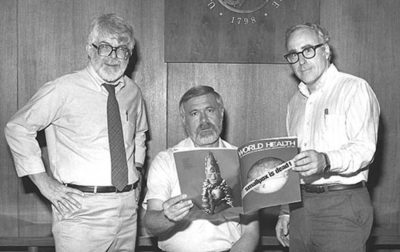
Directors of the Global Smallpox Eradication Program: Donald Millar (left), William Foege (center), and Michael Lane (right) in 1980. Source: Centers for Disease Control and Prevention Public Health Image Library
mallpox has been eradicated thanks to William Foege, who developed the global strategy for this accomplishment. Foege first zeroed in on an outbreak in a remote area of eastern Nigeria to predict who might be the lethal virus’ next victims. He surveyed places where individuals with early infections who still felt healthy might travel and inoculated people in those locations. As a result, Foege’s team contained the outbreak within 2 weeks by vaccinating only 7–8% of the population.
This early success led to wider implementation of the strategy, known as “surveillance and containment.” Smallpox was eradicated from West Africa 1.5 years earlier than expected at a lower cost than anticipated. This approach laid the groundwork for worldwide eradication. In 2001, Foege received the Mary Woodard Lasker Public Service Award for this achievement. When accepting the honor, Foege said,
“Not one of us can do much alone. The power is in the accumulation of every last one of us, bound together in shared goals, adding our paltry daily allowance until the contributions of millions of people in research and academics finally develop a vaccine.”
Inspired by his uncle’s work as a missionary in New Guinea, Foege knew by the time he was a teenager that he wanted to practice medicine in Africa. He decided to pursue global health while serving as an Epidemic Intelligence Service officer in the United States Public Health Service. In December 1966, Foege signed on with the US Centers for Disease Control and Prevention (CDC) to tackle smallpox in Nigeria and was running a clinic in West Africa when he began attempting to eliminate the disease.
Foege devised the eradication strategy and directed the World Health Organization’s Global Smallpox Eradication Program (SEP), which operated from 1966 to 1980. His predecessor and successor at SEP, Donald Millar and Michael Lane, respectively, played significant roles in implementing the program, as did hundreds of others in laboratories and local clinics.
Since his work on smallpox, Foege led CDC efforts to elucidate toxic shock and Reyes syndromes and created guidelines to slow transmission of HIV. Currently, he is a senior fellow with the Bill & Melinda Gates Foundation global health program.
